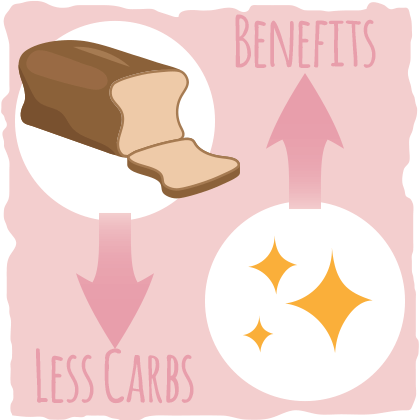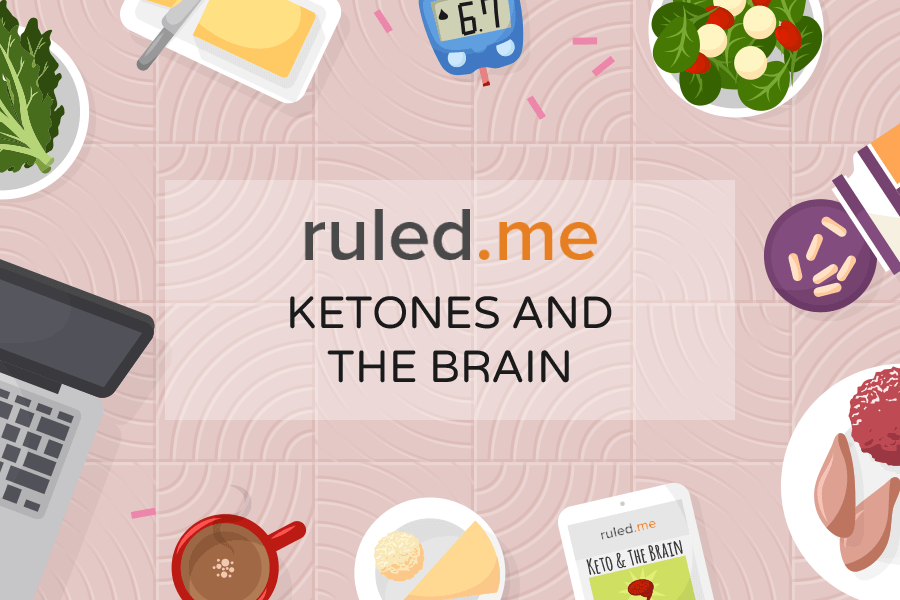The ketogenic diet has many unique benefits that no other diet can replicate, and they are probably not what you think they are. Many myths have been circulating the internet about why the ketogenic diet provides such incredible results.
Some scientists say that the magic effects of keto are due to how it reduces insulin levels, freeing fat from fat cells and improves brain function. Others say that the ketogenic diet has a significant metabolic advantage, which leads to more calories burned than on any other diet.
Although there may be a shred of truth behind these hypotheses, they are all being blown out of proportion. By misinterpreting the available evidence, many low-carb proponents have been perpetuating so many inaccurate assumptions that the legitimate advantages of following the ketogenic diet are getting lost in the shadow of controversy.
Unveiling the Secrets Behind Keto: It’s (almost) All In your Head
When Dr. Kevin Hall and his Colleagues looked at the studies regarding the differences between high-carb and low-carb diets in their recent meta-analysis, they found that fat loss had little to do with a metabolic advantage of burning a particular fuel source or insulin levels. Although some people may have a slight metabolic advantage by eating low-carb ( and the same goes for eating high-carb as well), it is not significant enough to explain the weight loss that many experience on the low-carb diet.
Furthermore, based on the current data, insulin levels don’t have the impact that many low-carb proponents believe it does, as both high-carb and low-carb diets with the same amount of protein and calories both lead to similar weight loss results.

The truth behind what insulin does is much more complex than just merely acting as a fat storage hormone. For example, insulin plays a role in increasing thyroid output, which leads to an increase in resting energy expenditure. In other words, having insulin levels high at the right times can provide us with a slight metabolic advantage. This is just one example of the many things that insulin does throughout the body, and it already provides us with evidence that contradicts the hypothesis that eating low-carb has a “metabolic advantage.” Regardless, the role eating low-carb vs. high-carb seems to play in fat loss is not as prominent as calorie intake.
According to the data from the meta-analysis, calories are the most important factor when it comes to gaining and losing weight. This means that, although there may not be a true metabolic advantage of any diet, it is best for us to find a diet that allows us to control our calorie intake naturally.
One of the best ways to control calorie intake is replacing palatable foods like candy, chips, and french fries for highly satiating foods like low-carb vegetables, meats, and cheese. This is why the low-carb diet is so effective — it consists of such satiating foods that you feel like you ate 3,000 calories when you only had 2,000.
On the other hand, a high-carb diet can be beneficial as well. However, it is much harder to control your calorie intake on a high-carb diet because so many tasty high-carb snacks are constantly demanding your attention. Eventually, you will give into the urges to overeat, which is why many people fail to maintain a healthy weight when they put no restrictions on themselves.
In other words, when it comes to weight loss, follow a diet that works best for you. Many people will find the ideal diet to be the low-carb ketogenic diet — not because it has a magical advantage over eating carbs, but because it helps you to eat fewer calories without starving yourself.
However, this doesn’t mean that the benefits of cutting out carbs are all in your head. Well, actually, they are.
The primary advantage that the ketogenic diet has over every other diet — including the low-carb diet — is its ability to increase ketone levels. By burning ketones for fuel, we can experience many unique benefits that no other diet can match.
The Biggest Advantage that the Ketogenic Diet has Over Every Other Diet
The benefits of the ketogenic diet are clear when we look through the research. Restricting carbs can help a wide range of conditions, including:
- Epilepsy
- Type 2 Diabetes
- Type 1 Diabetes
- High Blood Pressure
- Alzheimer’s disease
- Parkinson’s disease
- Chronic Inflammation
- High Blood Sugar Levels
- Obesity
- Heart Disease
- Polycystic Ovary Syndrome
- Fatty Liver Disease
- Cancer
- Migraines

However, other diets and lifestyle changes can help with many of these issues as well, so is the ketogenic diet anything special? Yes, but not when we look at the diet from a macronutrient and micronutrient perspective. The power that the ketogenic diet has to improve health lies in what it makes the body do — burn ketones.
Ketogenesis, Ketosis, and Ketones: A Lifesaver With Benefits

When we restrict carbs, a couple of things start happening to meet the body’s sugar needs. First, we burn through our glycogen stores. Once glycogen is depleted, the body starts breaking down muscle to convert into sugar via a process called gluconeogenesis.
According to Dr. Chris Masterjohn, we would need to lose up to 2.2 pounds of lean mass every day during fasting just to meet our brain’s needs for sugar. At this rate, we would burn through muscle so quickly that we’d have no strength to find food and surely perish within the next couple weeks.
Luckily, the body has a backup plan called ketogenesis. To prevent excess muscle loss, the body starts burning more fat for fuel and converting some of the fatty acids from that fat into ketones via a process called ketogenesis. But why should our bodies even bother turning fat into ketones?
The main reason why the body has an alternative for fat is because the fats we burn for fuel in cells throughout the body cannot be used by the brain cells. The brain needs fast acting energy sources that don’t generate too many reactive oxygen species, not a slowly metabolized fuel like fat. Because of this, the liver developed the ability to convert fatty acids into an alternative energy source for the brain called ketones.
In fact, when the body is keto-adapted, ketones can fuel up to 75% of the brain’s energy requirement. Altogether, ketogenesis (the process of burning ketones for fuel) cuts down the amount of lean mass lost during fasting by 5-fold. In other words, rather than breaking down 200 grams of muscle per day, using ketones for fuel reduces our need to burn muscle for fuel to 40 grams of muscle per day. This allows us to survive for more extended periods of time without food than we would be able to without the help of ketones. The same holds true for those who are on the ketogenic diet, but to a lesser degree because moderate protein consumption helps prevent muscle loss.
Although ketones save the brain and body in times of need, this isn’t the main reason why the ketogenic diet is so powerful. Ketones don’t just provide another source of energy for the brain — they provide a more efficient source of fuel that confers many astounding benefits. To say it more succinctly, the unique benefits of keto are all in your head.
What Happens When the Brain Runs on Ketones

Ketones are burned using different pathways and enzymes than sugar, causing a cascade of effects that improve brain health. Let’s go over some of the ways that ketone bodies benefit the brain:
- Ketones are a neuroprotective antioxidant. They have been found in many animal models to act as an antioxidant, preventing harmful reactive oxygen species from damaging brain cells.
- Ketones are a more efficient energy source than sugar. Ketone bodies, beta-hydroxybutyrate in particular, are a more efficient source of energy per unit oxygen than glucose. Burning ketones may be an essential part of maintaining the health of aging brain cells because brain cells tend to lose their ability to use glucose efficiently as fuel over time.
- Ketones increase mitochondrial efficiency and production. The ketogenic diet causes a coordinated upregulation of mitochondrial genes and genes involved in energy metabolism while stimulating the biogenesis of mitochondria. Altogether, this enhances the capacity of brain cells, protecting them from strokes and neurodegenerative diseases like Alzheimer’s disease and Parkinson’s disease.
- Ketones increase GABAergic tone and decrease glutamatergic tone. Glutamate, the brain’s main excitatory neurotransmitter, is the precursor for GABA, the brain’s main inhibitory neurotransmitter. Glutamate is essential for neural communication, memory formation, learning, and regulation, but in certain conditions, glutamate can become excitotoxic. In other words, nerve cells can become damaged or killed by excessive stimulation of glutamate, which sets the stage for a variety of issues like multiple sclerosis, Alzheimer’s disease, amyotrophic lateral sclerosis (ALS), and Parkinson’s disease. Although the mechanisms are unclear, ketones have been found to decrease glutamatergic tone and increase GABAergic tone, which helps prevent brain cell damage and improve function.
- Ketones trigger the expression BDNF. BDNF or Brain-derived neurotrophic factor is a protein that acts on specific neurons in throughout the nervous system. It helps to support the survival of existing neurons while encouraging the growth and differentiation of new neurons and neuronal connections. Ketones have been found to trigger the expression of BDNF in ways that can improve the function of the hippocampus, cortex, and basal forebrain—areas of the brain, which are vital in learning, memory, and higher thinking.
Whether you want to boost brain function, prevent neurodegenerative disease, or reduce the severity of a brain-related issue, the ketogenic diet one of the best ways to do it. By using the ketogenic diet to enter ketosis, you provide your body and brain with a more efficient fuel source that decreases inflammation and neuronal damage, improves brain cell growth and function, and regulates your brain’s neurotransmitters.
As an added bonus, you will be eating highly-satiating, healthy foods that will help you eat fewer calories, improve health, and lose fat rapidly. This is what makes the ketogenic diet a win-win for many people, especially those with neurological conditions.
Ketones and The Ketogenic Diet As A Potential Treatment for Common Neurological Conditions

Of the diseases and disorders that are most perplexing, neurological-based conditions tend to be the most difficult to treat. The interplay between neurons, astrocytes, neurotransmitters, genetics, and environmental factors is enough to make your head spin (perhaps because of having too much glutamatergic tone).
However, by studying the effects that ketones have on the brain, scientists have been able to understand many neurological conditions on a deeper level, allowing us to open the door to better treatments — and it all started with epilepsy.
Epilepsy
Many clinical studies have found that the ketogenic diet helps reduce the quantity and severity of seizures. Animal model evidence suggests that this is due to the effects that using ketones for fuel have on the brain. For more on how the ketogenic diet helps those with epilepsy, follow this link.
Alzheimer’s Disease
The current evidence suggests that supplementing with ketones and/or following the ketogenic diet is a safe and effective approach that should be used to improve the quality of life in Alzheimer’s patients. Some animal model evidence even suggests that the disease can be reversed with the ketogenic diet. For a multifaceted approach to preventing and potentially reversing Alzheimer’s disease, check out our recent article on the subject.
Parkinson’s Disease
There is a lack of clinical data on how keto and ketones can help people with Parkinson’s disease, but there is plenty of lab and animal work and case studies that have found the ketogenic diet to improve many Parkinson’s symptoms.
Because of the current state of the evidence, it is best to look at the ketogenic diet as an effective supplementary treatment for Parkinson’s disease, used to enhance the effectiveness of current therapies. For more on the topic of keto and Parkinson’s disease, click here.
Autism Spectrum Disorder
Although there isn’t much high-quality research on how the ketogenic diet affects those with autism, the existing evidence suggests that it can help reduce many common autism-related symptoms. For example, studies have found that the ketogenic diet can vastly improve milder cases of autism, while case studies indicate that it may even help patients with more severe cases of autism. To dig deeper into the research on the ketogenic diet and autism, click here.
Gliomas
Gliomas are one of the most common forms of brain cancer, affecting about 10,000 patients each year — nearly half of whom die within 15 months of diagnosis. Fortunately, many case studies and randomized controlled trials have found that carbohydrate restriction has the potential to delay cancer growth when used with conventional treatments (such as chemotherapy). For a more in-depth interpretation of the research on keto and cancer, follow this link.
Traumatic Brain Injury
The annual incidence of traumatic brain injury far exceeds the rates of any other disease in the United States, yet therapies and research have yet to evolve. However, recent studies on rats have found that the neuroprotective of effects of ketones can help with traumatic brain injury recovery. Although the effectiveness has yet to be proven in humans, the current evidence suggests that the ketogenic diet may have a tremendous therapeutic potential for both children and adults who sustain head injuries.
Stroke
Although clinical trials are currently being published on the effects of ketone boosting supplements and ketogenic diet on stroke patients, animals studies have found promising results.
In a recent analysis of the studies on animal models of stroke, the authors concluded with “we found beneficial effects on pathologic and functional outcomes of dietary intervention [the ketogenic diet], or exogenous ketone administration, either prior to or following experimental stroke.” For this reason, the ketogenic diet and ketone boosting supplements may be one of the most cost-effective ways to reduce stroke incidence and improve stroke recovery.
Multiple Sclerosis
The ketogenic diet also has the potential to treat some of the components of progressive multiple sclerosis. The current research suggests that the ketogenic diet can help those with multiple sclerosis by increasing energy efficiency, promoting mitochondrial function, and protecting neuron with the antioxidant effects of ketones. Altogether, these benefits may be able to prevent or slow the progression of neurodegeneration, which is a common component of the disease.
Amyotrophic Lateral Sclerosis
Amyotrophic lateral sclerosis (ALS) is a fatal neurodegenerative disease that progressively weakens muscles, decreasing physical function. Medication and therapy can slow ALS and reduce discomfort, but there is very little research on how diet can affect ALS patients.
The available epidemiologic evidence suggests that increased dietary fat and cholesterol intake might reduce the risk of amyotrophic lateral sclerosis and the rate disease progression. Also, data from animal studies indicate that increasing dietary intake of fat will slow disease progression.
The current evidence implies that the ideal diet for ALS is a high-fat ketogenic diet, but to determine whether ALS patients should be treated with a ketogenic diet can only be based on randomized double-blind placebo-controlled interventional trials.
By no means is this a comprehensive list of the neurological conditions that can be helped by ketones and the ketogenic diet. The research on how carb restriction and ketone usage impact various neurological conditions is still in its infancy, and we are only beginning to understand the tip of the ketone-burning iceberg.
We do, however, have a pretty clear understanding of the potential side effects that ketones have on the body.
The Side Effects of Ketones and The Ketogenic Diet
Having increased ketone levels were once only thought of as a bad omen, not a therapeutic tool. Decades ago, the only time most doctors would see high ketone levels was in type 1 diabetics who developed a lethal condition called ketoacidosis.
Ketoacidosis would occur when blood sugar and ketone levels were out of control — a phenomenon that can only be experienced by people who have insufficient insulin levels (e.g., people with type 1 or type 2 diabetes that aren’t administering their medication properly) and people who are undergoing ridiculously high levels of stress (e.g., fasting from all food while breastfeeding).

Fortunately, by following the ketogenic diet correctly, it is almost impossible for you to experience ketoacidosis. However, this doesn’t mean that you won’t experience some side effects.
While you are adapting to the ketogenic diet, your body has to make rapid changes so that it can adjust to carbohydrate restriction. This commonly results in minor side effects like mild dehydration and muscle loss during the first few days to a week of keto dieting. However, if you follow the suggestions in our article on the keto flu and how to remedy it, you can stave off the side effects and experience the many benefits we spoke of earlier in this article within one week of following the ketogenic diet.
Putting It All Together
The ketogenic diet has a plethora of benefits, but many of them can be explained by how it is much easier to consume fewer calories on a low-carb diet, which makes it easier to lose weight consistently. Although ideas like the “carbohydrate-insulin hypothesis” and the “metabolic advantage of fat burning” are not the reason for the weight loss that many people experience on the ketogenic diet, this doesn’t mean that keto is just like any other diet.
Restricting carbs to the point of producing and burning ketones has many unique benefits, especially in the brain.
For example, ketones:
- are a neuroprotective antioxidant.
- are a more efficient energy source than sugar.
- increase mitochondrial efficiency and production.
- help regulate neurotransmitters throughout the brain.
- trigger the expression BDNF.
The positive effects of ketones can help people with a wide range of conditions like epilepsy, autism spectrum disorder, Alzheimer’s disease, and many others. What’s even more promising is that more potential benefits of ketones are still being elucidated through research, so we may find that their therapeutic potential extends beyond what we have studied so far.
Whether we discover more about ketones or not, research has made it clear that the ketogenic diet provides various neurological benefits that cannot be fully experienced by following any other diet. To learn more about the ketogenic diet and how to reap these unique benefits, check out our comprehensive beginner’s guide to the ketogenic diet.
Sources:
- A review of the carbohydrate—insulin model of obesity — NCBI
- Exercise promotes the expression of brain derived neurotrophic factor (BDNF) through the action of the ketone body β-hydroxybutyrate — NCBI
- The Neuropharmacology of the Ketogenic Diet — NCBI
- Brain-derived Neurotrophic Factor — NCBI
- DIET, KETONES AND NEUROTRAUMA — NCBI
- Stroke outcome in the ketogenic state – a systematic review of the animal data — NCBI
- Effects of a Ketogenic Diet on Acute Stroke — Clinical Trials
- Neuroprotective and disease-modifying effects of the ketogenic diet — NCBI
- Can Low Carb, High Fat Ketogenic Diets Improve MS And Other Neurological Disease Symptoms? — Multiple Sclerosis News Today
- The Therapeutic Potential of the Ketogenic Diet in Treating Progressive Multiple Sclerosis — Hindawi
- High-Fat and Ketogenic Diets in Amyotrophic Lateral Sclerosis — NCBI
- Obesity Energetics: Body Weight Regulation and the Effects of Diet Composition. — NCBI
- Meta-analysis: Impact of carbohydrate vs. fat calories on energy expenditure and body fatness — Stephan Guyenet, PhD
- Thyroid hormone as a determinant of energy expenditure and the basal metabolic rate. — NCBI
- Transcriptional control of the forkhead thyroid transcription factor TTF-2 by thyrotropin, insulin, and insulin-like growth factor I. — NCBI
- Coupling between Nutrient Availability and Thyroid Hormone Activation. — NCBI

